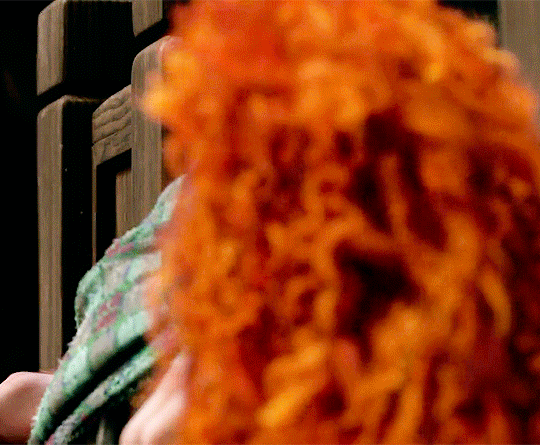Text




Hutsul animal motifs in traditional Ukrainian pysanky (decorated Easter eggs). Ukraine, 1950s to 1980s.
Collection of Ivan Honchar Museum in Kyiv.
2K notes
·
View notes
Text



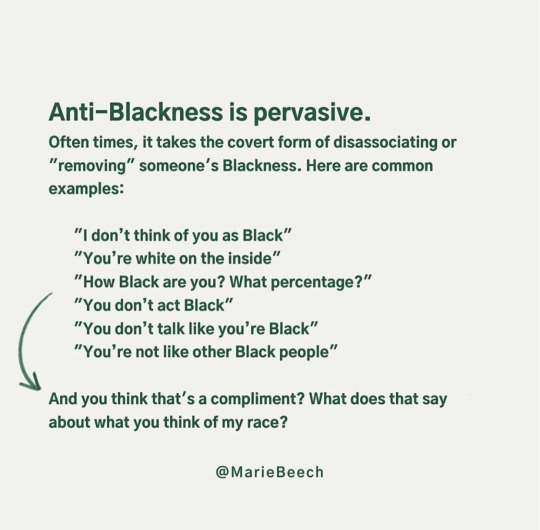
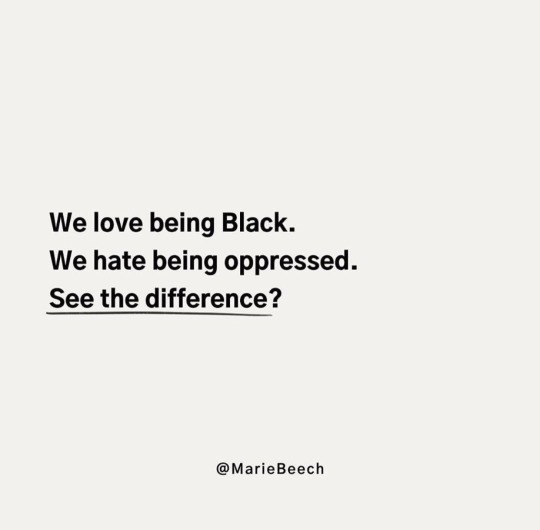

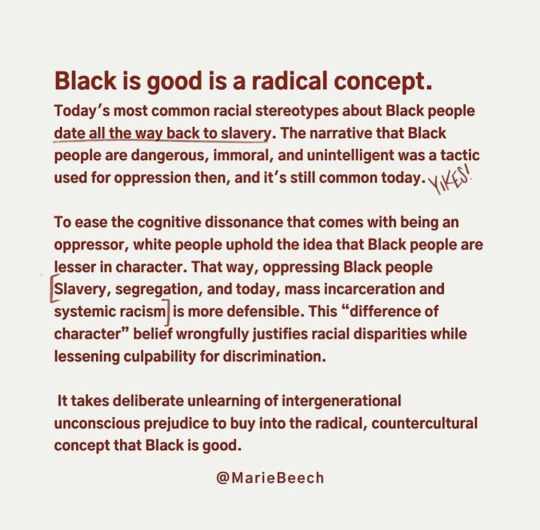

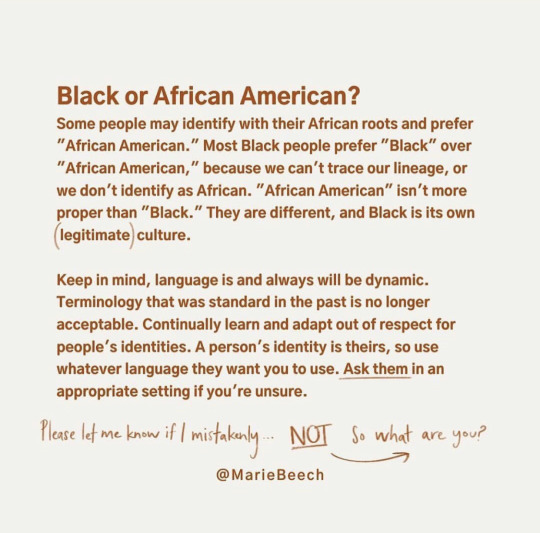
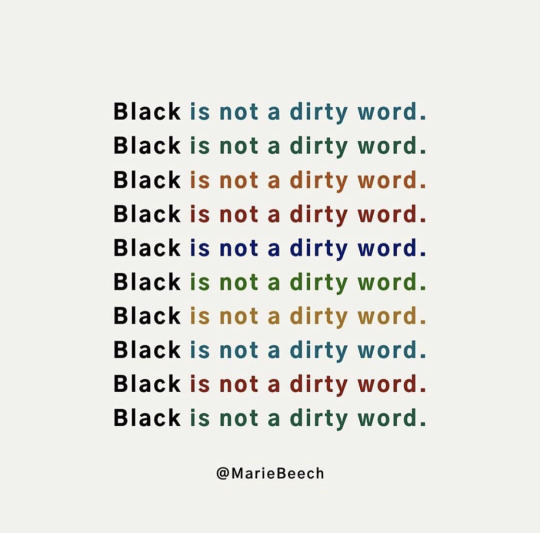
Black is not a dirty word.
Click here for 200+ free social justice and mental health resources. Follow @bfpnola for more!
And please remember, Black is good is a radical concept, but radical concepts are what create change. Keep fighting.
77K notes
·
View notes
Text
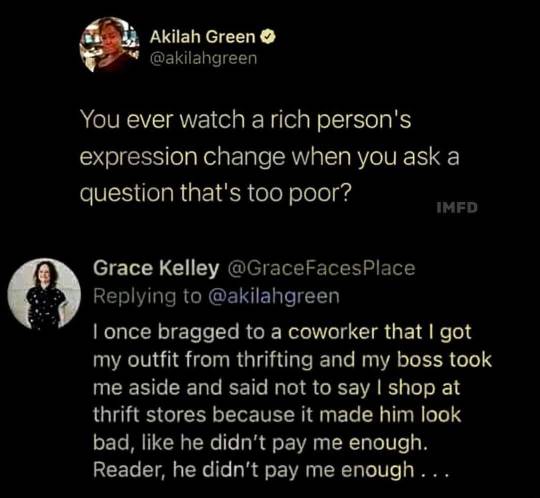
If you want to look like you pay your employees well, then pay them well. It's not rocket science.
47K notes
·
View notes
Text
It's wild that you don't necessarily need to even be abused to have childhood trauma. Like just having an excessively negative, spiteful, toxic and mean-spirited parent is enough, even if they never do it at you, or on purpose. Imagine being a doctor and explaining that to a parent.
"Hey you know how you don't have any friends because people find you unpleasant to be around? Well it turns out that your child is also a person, and finds you unpleasant to be around. Growing up in an environment where they are constantly subjected to your opinions technically counts as torture, since the situation was both continuously distressing and inescapable. You are literally so annoying that you gave your child brain damage."
30K notes
·
View notes
Text
Dick riding IS NOT a form of transportation!!!!!!!!
720K notes
·
View notes
Note
I saw a comment on your blog that says 'the way you eat does not cause diabetes'...are you able to expand on that or provide a source I could read? I've been told by doctors that my pre-diabetes was due to weight gain because I get more hungry on my anti psychotics and I'd like to fact check what they've told me! Thank you so much!
Pre-diabetes was rejected as a diagnosis by the World Health Organization (although it is used by the US and UK) - the correct term for the condition is impaired glucose tolerance. Approximately 2% of people with "pre-diabetes" go on to develop diabetes per year. You heard that right - TWO PERCENT. Most diabetics actually skip the pre-diabetic phase.
There are currently no treatments for pre-diabetes besides intentional weight loss. (Hmm, that's convenient, right?) There has yet to be evidence that losing weight prevents progression from pre-diabetes to T2DM beyond a year. Interestingly, drug companies are trying to persuade the medical world to start treating patients earlier and earlier. They are using the term “pre-diabetes” to sell their drugs (including Wegovy, a weight-loss drug). Surgeons are using it to sell weight loss surgery. Everyone’s a winner, right? Not patients. Especially fat patients.
Check out these articles:
Prediabetes: The epidemic that never was, and shouldn’t be
The war on ‘prediabetes' could be a boon for pharma—but is it good medicine?
Also - I love what Dr. Asher Larmie @fatdoctorUK has to say about T2DM and insulin resistance, so here's one of their threads I pulled from Twitter:
1️⃣ You can't prevent insulin resistance. It's coded in your DNA. It may be impacted by your environment. Studies have shown it has nothing to do with your BMI.
2️⃣ The term "pre-diabetes" is a PR stunt. The correct term is impaired glucose tolerance (or impaired fasting glucose) which is sometimes referred to as intermittent hyperglycemia. It does not predict T2DM. It is best ignored and tested for every 3-5yrs.
3️⃣ there is no evidence that losing weight prevents diabetes. That's because you can't reverse insulin resistance. You can possibly postpone it by 2yrs? Furthermore there is evidence that those who are fat at the time of diagnosis fair much better than those who are thin.
4️⃣ Weight loss does not reverse diabetes in the VAST majority of people. Those that do reverse it are usually thinner with recent onset T2DM and a low A1c. Only a tiny minority can sustain that over 2yrs. Weight loss does not improve A1c levels beyond 2 yrs either.
5️⃣ Weight loss in T2DM does not improve macrovascular or microvascular health outcomes beyond 2 years. In fact, weight loss in diabetics is associated with increased mortality and morbidity (although it is not clear why). Weight cycling is known to impacts A1c levels.
6️⃣ Weight GAIN does NOT increase the risk of cardiovascular OR all causes mortality in diabetics. In fact, one might even go so far as to say that it's better to be fat and diabetic than to be thin and diabetic.
Dr. Larmie cites 18 peer reviewed journal articles (most from the last decade) that are included in their webinar on the subject, linked below.
29K notes
·
View notes
Text
"what's the plot of wheel of time?"
Man, what ISN'T the plot of wheel of time
553 notes
·
View notes
Text
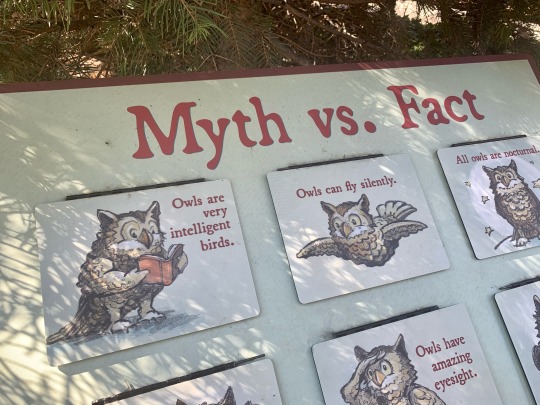
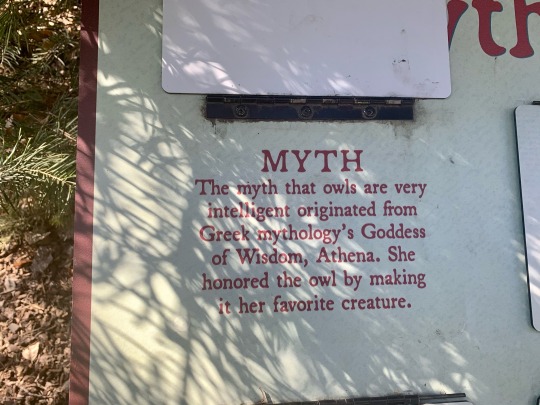
I went to the local aviary today and they had some really mean things to say about owls.
113K notes
·
View notes
Text
5K notes
·
View notes
Text
there's a cherry blossom tree in DC that keeps blooming every year even though it shouldn't and the park service keeps thinking it's dead and then it keeps blooming! well they're removing a lot of trees to rehabilitate the area and they've said it's finally time for stumpy to go and they're going to mulch it and use the mulch to enrich all the other trees so it can help everything else keep going. and they're also going to plant spliced little pieces of it all over so that stumpy can live forever and this is genuinely sending me into a spiral
65K notes
·
View notes
Text
I don't know what tenth circle of hell my YouTube algorithm fell into, but I really wish it would stop showing me videos of 5 a.m. morning writing routines.
2K notes
·
View notes
Text
Solicited Brilliance
Hey everyone! This is Aria, one of the resident fandom olds here to bring you a guest blog post this week. The topic is near and dear to my heart, so let’s dive straight into talking about that ever-ominous thundercloud - Writing Advice!
Writing advice is a tricky subject for many authors - what works for one clearly doesn’t work for another, and what’s essential for one genre might not even apply to another genre . (Certain authors can pry adverbs from my cold, dead hands.) It doesn't matter who is offering it, where, or when: it is an industry truism that writing advice is as varied as writers themselves.
With that in mind, I asked ten different authors for writing advice, in the hope to highlight just how different we all are, even when approaching the same question.
The question I posed to everyone individually (so no one would get worried if they gave the same answer), was as follows: What is one piece of writing/writerly advice you hold as a Universal Constant? That no matter what you are writing or what you are working on still holds true?
As I hoped, the advice is as varied as the authors are!
-
@nottesilhouette:
Hmm I think for me, the Universal Constant is that [my writing has] got to make me feel good. Not necessarily happy, because I've definitely written through tears before, but it's got to make me feel...satisfied, or give me catharsis, or lead me towards a goal I'm passionate about (looking at you, med school essays!).
Even if [my writing is] for school, getting things done feels good, and for creative writing, I want to feel like I've stretched my writing brain or accomplished something cool -- if I'm not getting that feeling, it's time for a break and maybe a new plan of attack.
-
Hermit:
"You can't think your way out of a writer's block. Most of the time you need to write yourself out of a thinking block.” - John Rogers
When a story is fighting me this is often the solution. Either the scene is going against the characterization, the characters are lacking agency/being too passive, or I went wrong three sentences back; the answer to getting the story flowing is to write it differently and see how that feels. Rather than try to force an existing scene by coming up with better justification for an OOC (Out of Character) passage or diving into a new research rabbit hole.
-
Shadaras:
I don't know where this advice first came from (it's one of those things that just gets passed around until it's from the general writer mindscape, especially in fandom spaces), but this is the advice I tend to ground myself in: "Write what you want to read." What that means can vary depending on context, of course, but it gives a guiding point to return to when I'm stuck.
The thing I want to read could be a specific character dynamic, or leaning into descriptions of the environment, or a plot beat I really want to hit, or even (in a nonfiction context) just the clearest explanation of an event/rule I know how to give. Writing what I want to read means that I'm going to enjoy myself more, and that means that I'm going to be able to write much more easily, and that makes it more likely I'll finish stories and be able to share them with other people - and then I can find people who like the same things in stories I do, and we all win!
-
Annabeth Lynch:
The most constant advice that I really try to keep in mind is that sure, someone else may have written it, but not you. Everyone has unique experiences, and that makes your writing unique. No one can write something the exact way you would. It's my favorite advice I've ever gotten, and I feel that it's always relevant.
-
@ts-knight:
Writing by habit is often easier than waiting for the muse. When I feel out of practice in my writing, I find that starting again is an uphill climb, but setting a daily goal helps me get back into the flow. That goal could be just writing at all or a certain (achievable) number of words. That way, I know I've reached the goal not when I've hit a certain quality of writing, but when I sat down at the keys. Exercising my writing muscles (even when I'm afraid to) makes the creativity flow so much better than avoiding the ominous blank page!
-
@mad-madam-m:
[My writing advice is] that you have to finish. And I don't mean that you have to finish everything that you write; I've got easily a dozen stories or more that are either unfinished or never made it past the first draft. But if you're writing with the goal of sharing your stories with an audience, be that via fanfic or original fiction or what have you, I really think one of the best things you can do is learn to finish them. This quote about it in particular is one that I've held close to my heart for years:
“Finish. The difference between being a writer and being a person of talent is the discipline it takes to apply the seat of your pants to the seat of your chair and finish. Don’t talk about doing it. Do it. Finish.” — E. L. Konigsburg
-
Sanne Burg:
I think my universal constant is that I write because I want to write, and I create for myself. That means not caring what other people think of the topics I write [about], as long as I'm behind whatever it is I'm writing. (It also means that I know when I'm forcing it and that I need to stop when writing becomes a chore rather than something for fun or a hobby.)
-
@theleakypen:
I think the one [piece of writing advice] that has been truest for me, regardless of what I'm working on, is that if something isn't working [I should] step away from it for a bit and go work on something else. Usually if there's a problem, I need to let it percolate in the back of my head instead of banging my head against a wall.
-
ThePornFairy:
Focus on the feeling. If you can write the feeling so that it's filling you from the tips of your toes to the hair on your head, then you're on the right track. People don't care half as much about the setting and wording as they do about the feeling.
When people say "step inside your character", I think what they mean is "let your character feel and feel along with them until feelings come out on your page and stab your reader's eyeballs until they're feeling right along with you." Everything else can be edited later, as long as you capture and express the emotions.
-
@tryslora:
Fall in love with your characters. If you don't love them, no one else will. And yes, this includes the antagonists and every single side character. And while you're doing that, remember that every single character thinks they are the star of their own narrative, so let them tell you what it is, even if it's not the main storyline. Let them come alive.
-
Wonderfully said, everyone! I’m going to add my answer to the question as well, because sometimes, I’ve needed this reminder far more than I’ll admit!
@arialerendeair:
Don’t be afraid to write badly. Or poorly, or lazily. (Take that, Mr. Adverb-Hater.) There is a freedom I never realized before in allowing myself to write “badly:” to overuse certain words, phrases, and even styles as I write my rough draft. When I remember not to focus on the minutiae of a story, I can focus on the bigger problems, and fix the small ones later. Once the words are on the page, they can be fixed, but they have to be put on the page first. Write badly, edit, learn, get better, and write again.
Writing advice as a topic is a mix of controversial and contradictory; all advice should be applied in moderation rather than treated as an endless stream of syrup being poured over a stack of pancakes. (And now I want pancakes…) It’s always all right if advice doesn’t apply to you - but understanding why the advice is given is important. There are other authors out there who might need the advice that isn’t right for you.
When I set out to write this blog post, I had two goals. The first was I wanted to highlight how varied writing advice and tips can be. The second one was for everyone reading it to walk away with one piece of advice that they could hold to heart because it fit them. I accomplished the first, but the second is entirely up to every author reading this.
The one consistent theme through all of this advice comes down to two words: Keep Writing. Whether that’s daydreaming about your story or putting the words down on the page, write.
Keep writing.
Last, but not least, I’ll leave you all with the same question, because I know there are more answers out there that we all would love to hear:
What is one piece of writing/writerly advice you hold as a Universal Constant? That no matter what you are writing, what you are working on, still holds true.
Stay sassy, everyone!
94 notes
·
View notes
